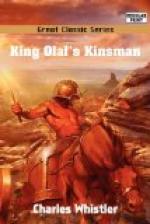Maybe I was glad to think that the maiden did care that I went, were it ever so little, though I would not believe that it was so.
So I came back into the Thames to Olaf, and glad was he to see me once more, and that I was in no wise the worse now for my hurts. And in his company it soon came to pass that I longed not at all for Penhurst, though at first it seemed to me that I should have little pleasure in life away from Sexberga. By and by I could laugh at myself for that thought, but I have never seen cause to be sorry therefor. There is no shame to a man that his mind has turned towards a maiden whom he knows that he could trust and reverence.
Chapter 7: The Fight At Leavenheath.
March and April went by, and Olaf had gathered good fleet enough in the Thames. But there was no word of Cnut’s return, though the dread thereof hung heavy over all the land, in such wise that no man could plan what he would do without the thought rising up, “Unless the Dane comes,” seeing that each day might bring news of him.
No man knows now what that terror and uncertainty was like—to have ever in one’s heart the fear of that awful host that seemed to sweep from end to end of the land before a levy could be gathered to meet it.
There had been time to gather a levy now against the coming of Cnut, but naught had been done. Sick at heart and impatient was Olaf, for England’s rulers would not take care for her safety.
Then came word of a great council to be held at Oxford, and we hoped much from that; but two days after it had been held there came to us, angry and desponding, Ulfkytel, our East Anglian earl, and told us how things had gone as ill as they might. Few words enough are needed to tell it, but none can know what harm was wrought thereby. Whereof Olaf says that a good leader will act first, and call his council afterwards.
All the best of England were there, not only Saxon thanes of Wessex, but also loyal Danes of the old settlement, and had the king spoken his will plainly, all would have been well. For of the Danish nobles, Utred of Northumbria and the two earls of the old seven boroughs, Sigeferth and Morcar, were at one with our earl and Eadmund for gathering a great levy, and keeping it together by marching through the Danelagh, and calling on the Danish thingmen, in the towns they yet held, to surrender.
That plan was good, and would have been carried out; but Edric Streone rose up and reminded Ethelred of how the march through Lindsey had done more harm than good.
“Cnut will not return,” he said, “and messages to these Danish garrisons with promise of peace if they surrender will be enough. But if we fall on them, they will grow desperate, and will send for Cnut to help them. If we win them to peace, Cnut cannot come back.”
Thereat Sigeferth of Stamford spoke hotly, minding Streone that the harm was done in Lindsey by pillage and burning wrought among peaceful folk, who were thus made enemies to the king. The thingmen would submit quietly if they knew they must; but if they were left, they would send word to Cnut that there was no force to oppose him.




